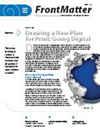Case Study on Developing a Comprehensive Voluntary Environmental Performance and Process Standard for Alpine Resorts Using Four Business Management Principles
IF 1.8
4区 环境科学与生态学
Q4 ENVIRONMENTAL SCIENCES
引用次数: 1
Abstract
In 2018, Jackson Hole Mountain Resort (JHMR) in Teton Village, WY, USA, discontinued its International Standards Organization 14001 environmental management system. JHMR needed a replacement voluntary environmental program (VEP) that would empower resort employees to directly mitigate climate change, reduce waste and pollution, minimize water use, and restore biodiversity, along with improving building, education, and purchasing. I developed the Model for Alpine Resort Sustainability (MARS) based on 2 research objectives of improving existing industry-specific VEPs and empowering employees to directly mitigate resort environmental impacts through their work. MARS involves 4 business management principles: (1) use ski industry-specific criteria to drive accountability comprehensively across 25 resort departments; (2) quantify greenhouse gas emissions, using both absolute and intensity or normalized bases, and apply quantification to solid waste production and water consumption; (3) employ modern management techniques and software to focus on action over documentation; and (4) strategically align with the core business objective of alpine resorts to provide profitable outdoor recreation by decreasing costs and increasing revenues. MARS provides the most comprehensive, research-based accounting to date of alpine resort environmental impacts and mitigation indicators. MARS could be applied to larger resorts receptive to change.运用四项商业管理原则为高山度假区制定综合自愿环境绩效和过程标准的案例研究
2018年,美国怀俄明州提顿村的杰克逊霍尔山度假村(JHMR)停止了其国际标准组织14001环境管理体系。JHMR需要一个替代的自愿环境计划(VEP),该计划将授权度假村员工直接缓解气候变化,减少浪费和污染,最大限度地减少用水,恢复生物多样性,同时改善建筑,教育和采购。我基于两个研究目标开发了高山度假村可持续发展模型(MARS),这两个研究目标是改善现有的行业特定vep,并授权员工通过他们的工作直接减轻度假村对环境的影响。MARS涉及4项业务管理原则:(1)使用滑雪行业特定标准,全面推动25个度假村部门的问责制;(2)量化温室气体排放,采用绝对和强度或归一化基准,并将量化应用于固体废物产生和水消耗;(3)采用现代管理技术和软件,注重行动而不是文件;(4)战略上与高山度假村的核心业务目标保持一致,通过降低成本和增加收入来提供有利可图的户外娱乐。MARS提供了迄今为止最全面的、以研究为基础的高山度假区环境影响和缓解指标核算。MARS可以应用于更大的乐于接受变化的度假村。
本文章由计算机程序翻译,如有差异,请以英文原文为准。
求助全文
约1分钟内获得全文
求助全文
来源期刊
CiteScore
3.10
自引率
18.80%
发文量
36
审稿时长
4.5 months
期刊介绍:
MRD features three peer-reviewed sections: MountainDevelopment, which contains “Transformation Knowledge,” MountainResearch, which contains “Systems Knowledge,” and MountainAgenda, which contains “Target Knowledge.” In addition, the MountainPlatform section offers International Mountain Society members an opportunity to convey information about their mountain initiatives and priorities; and the MountainMedia section presents reviews of recent publications on mountains and mountain development.
Key research and development fields:
-Society and culture-
Policy, politics, and institutions-
Economy-
Bio- and geophysical environment-
Ecosystems and cycles-
Environmental risks-
Resource and land use-
Energy, infrastructure, and services-
Methods and theories-
Regions

 求助内容:
求助内容: 应助结果提醒方式:
应助结果提醒方式:


